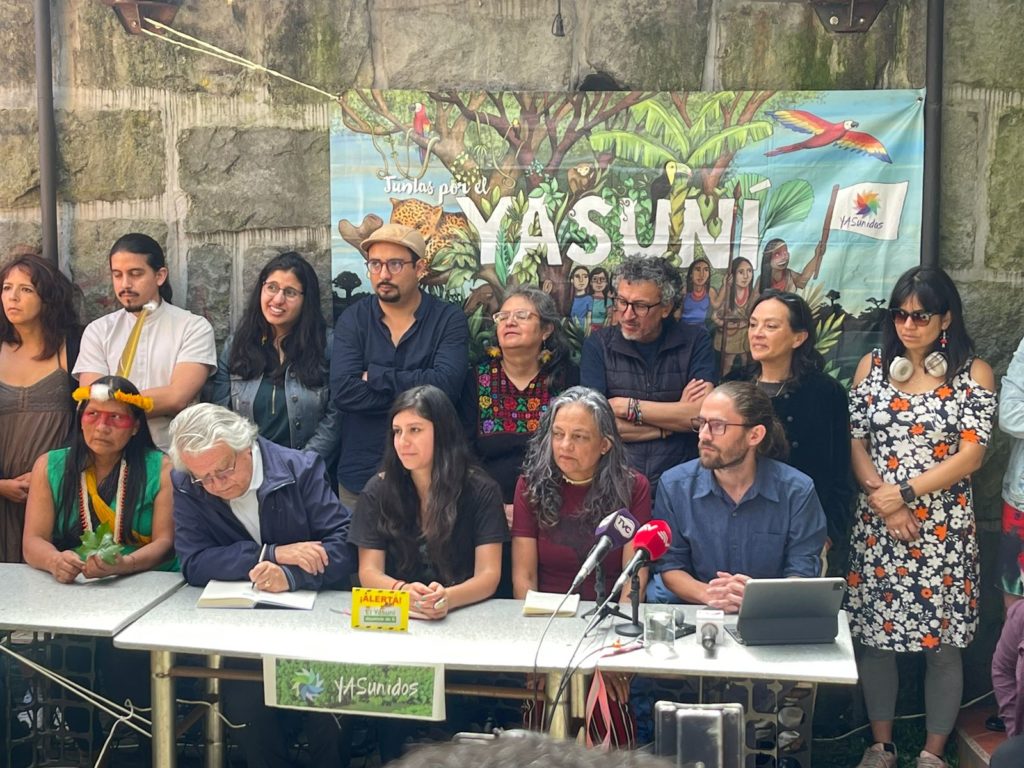(Quito, May 17, 2023, npla).- After ten years of waiting and political commitment, on May 9, 2023, the Constitutional Court of Ecuador ruled the referendum on oil production in Yasuní-National park approved. Since 2013, the civil society environmental collective YAUnited Demanded the referendum and collected over 750,000 votes to start the referendum. Since the decision was made, there are 75 days to hold the vote. Ecuadorians now have the opportunity to vote against oil production in the Yasuní rainforest. The Supreme Court’s decision is a historic event in Ecuador, as it is the first nationwide referendum initiated by civic groups. As far as the protection of human rights and the rights of nature are concerned, it is even a worldwide precedent that proves that a grassroots organization can defend rights with staying power and stop large-scale, destructive projects such as raw material extraction in the rainforest.
Ten years protest against oil activities
Fifty years ago, Ecuador started oil production in the Amazon region, home to a large number of indigenous peoples and an incomparable biodiversity. Since then, the oil business in the highly sensitive rainforest ecosystem has brought in billions of dollars in profits for transnational companies such as Texaco. At the same time, the costs and environmental burdens were passed on to the local population; thus the promises of development and poverty alleviation through the return on oil proved to be a myth everywhere. Poverty and inequality among the population in the oil-producing areas of the northern province of Sucumbios have even increased. In response to this, in 2007 the then government of President Rafael Correa initially agreed to support the Yasuní-ITT initiative launched by civil society groups. The idea went around the world: The oil in the Yasuní Amazon rainforest, under production block 43, also known as “ITT” (Ishpingo, Tibutini, Tambococha), will remain in the ground forever if the international community of states fails to compensate Ecuador for the lost government revenue contributes to the sale of the crude oil. The initiative brought criticism of our fossil-based development model and the rights of nature guaranteed in Ecuador’s constitution to the fore of the debate. However, in August 2013, Correa ordered the initiative to be terminated and began mining in the ITT block in Yasuní National Park. In response, the indigenous umbrella organizations of Ecuador and international environmental organizations, including the then German alliance for the Yasuní, initiated a series of protest actions and legal complaints and called for a referendum. The aim was not just to persuade the petroleum industry and the Ecuadorian government to stop oil activities. The same was true of the demand for justice: forest areas, rivers and fields had been polluted by oil spills and leaks. The affected indigenous communities should receive appropriate support, for example in the form of regeneration measures and compensation.
With fraudulent machinations against the referendum
A group of young people was formed from the ranks of those who were committed YASoundeds – a pun on Yasuní and “unidos” (“united”). They focused on a signature campaign asking the people of Ecuador if they would agree to keeping the ITT block’s oil in the ground permanently. This mechanism of direct democracy and the right to participation is part of the 2008 constitution of Ecuador. With the 757,000 signatures, the Ecuadorians expressed their clear will for this first nationwide and direct democratic initiative. Despite all objections, however, the politically motivated National Electoral Council (CNE) arbitrarily annulled more than 60 percent of the signatures collected. The collective then led YAUnited a legal battle against the Ecuadorian state for almost ten years to uncover the fraud. Legal actions, appeals, injunctions, protective measures and requests for information were part of this commitment, as well as impressive international solidarity and support, including from German civil society. After winning various legal instances and officially acknowledging that the Ecuadorian state violated the right to participation of thousands of citizens by annulling the votes, the Constitutional Court of Ecuador gave the go-ahead on May 10, 2023 for the Yasuní referendum.
Does the political crisis leave room for environmental issues?
The survey must be completed by mid-July 2023. That the people of Ecuador can vote to stop oil production in the Yasuní is a great victory for the rights of nature; The verdict is also trend-setting for the indigenous population groups who live in voluntary isolation, without contact with the “Western world”, in the Yasuní. A decision to halt the advance of the Yasuní oil frontier could also mean a gradual and orderly closure of all oil fields in Ecuador’s Amazon region. The YASunidos call this a milestone in an ecological transition and a historic event for Ecuador and the world because it represents the first national-level direct-democratic initiative with legally binding force approved by the Constitutional Court. In view of the political crisis that Ecuador has been in since President Guillermo Lasso dissolved parliament on May 17, 2023, it is unclear whether the rainforest will remain a marginal issue or whether public interest is great enough to actually hold the referendum in a timely manner.
In the midst of the debates about the implementation of the Paris climate agreement to curb global warming, however, the initiative makes a concrete contribution to the importance of grassroots democratic participation for reversing the ecological crisis and questions the capitalist model of growth and development.
![]()
Green light for a historic referendum von News Pool Latin America is licensed under Creative Commons Attribution-Share Alike 4.0 international.
